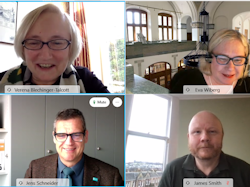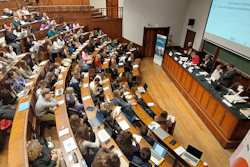Time is flying. Whilst every European university pilot, just as Una Europa, is busy implementing their first initiatives, the discussion on the future roll-out of the initiative is quickly gaining momentum. Ahead of the European Commission's consultation on the transformation of Higher Education and the Council Conclusions scheduled for May, the leadership of Una Europa and seven other Alliances have shared their joint reflections in an Opinion Piece in Research Europe on 10 March.
On 3 March, Una Europa also hosted a high-level panel discussion on the future roll-out of the European Universities initiative. Representatives from three alliances, Una Europa, EUTOPIA and UNITE!, exchanged their views on current challenges, shared hopes and ideal parameters for future policies and funding. Embedded in the third and final day of Una Europa’s first Staff Week, the event attracted more than 330 participants from the Una Europa universities, other alliances and the Brussels policy arena.
The 3 March panel debate featured James Smith, Vice-Principal International of the University of Edinburgh, and member of the Una Europa Board of Directors, Eva Wiberg, Vice-Chancellor at the University of Gothenburg, and Chair of EUTOPIA, and Jens Schneider, Vice President of Transfer and International Affairs at Technische Universität Darmstadt, and Representative of UNITE!.
Moderated by the Chair of Una Europa’s Board of Directors, Verena Blechinger-Talcott, Vice-President International at Freie Universität Berlin, the discussion was a true testimonial of the positive energy and transformative potential that European Universities can deliver.
Take-away #1 - Think global
All panelists stressed the important global dimension of European Universities, with challenges such as Covid-19 and sustainability calling for international solutions. Other regions in the world, notably Africa, will see a sharp increase in population in years to come, hence driving global needs for education. As ‘new experiments’, European Universities can provide the breeding ground for new models of collaboration and mutual learning. As Eva Wiberg put it: “The pandemic has shown very (…) clearly that we need to reach out. And it’s not (us) helping the rest of the world, but we can learn a lot from the others.”
" I don’t think it is enough to be only a European University of the Future. We live in a world of complex, intractable challenges (…) and these are problems that require complex solutions, there is no simple local solution, we have to work together. "
James Smith, Vice-Principal International of the University of Edinburgh, and member of the Una Europa Board of Directors
Take-away #2 - Go holistic
Panelists agreed on the need to think holistically. With traditional boundaries between teaching, learning and research becoming increasingly blurred, future funding instruments need to be flexible and integrated, accommodating and supporting new ways of working across all strands of the university mission.
" We are not only research institutes and we are not only education institutes, we are both (...). So we must try to reform the Bologna process. "
Eva Wiberg, Vice-Chancellor at the University of Gothenburg, and Chair of EUTOPIA
Take-away #3 - Plan long-term
Panelists joined forces in calling for long-term financial and political support for European Universities, stressing the need for complementarity of national and European funding sources and pragmatic approaches to eliminating barriers to cross-border collaboration. According to James Smith, funding should be seen as enabler, a means to "create pockets of time", unlocking the creativity of academics and professional services staff who "tend to be ideas rich, but time poor".
A longer-term funding perspective is vital for European Universities to deliver. Or, in the words of Eva Wiberg: "If we are going to be sustainable, we have to think about a project that is beyond 3 or 4 years. So actually Eutopia2050 is what we are working on."
Reflections also touched on the important balance of top-down and bottom-up activities. With Alliance activities speeding up, engagement of students and staff needs to be deepened to anchor joint action in everyday university life. As Jens Schneider stressed: "we have make sure that we get the bottom-up approach as well, so for example the student involvement and the involvement of the administration."
" The regulative barriers in the national states, they are a big obstacle (...), but I don’t think that we can overcome them by (...) another thing on top of everything (...). We need pragmatism to make Bologna what it should be. "
Jens Schneider, Vice President of Transfer and International Affairs at Technische Universität Darmstadt, and Representative of UNITE!
That much is certain: Despite practical challenges the European Universities pilots are experiencing, they undoubtedly provide a source of significant positive energy, which in turn has tremendous transformational potential. Verena Blechinger-Talcott nicely summed up this impression in her concluding remarks: "Working on Una Europa is always fun (…). You have the most creative minds of all member universities who come together (…); this is something we should really preserve in Europe to move Europe forward (…) and to make our universities stronger."



